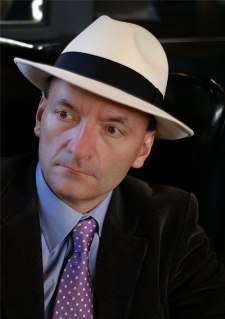|
Back
Intelligence and Instinct New York
Isaac Stern Auditorium, Carnegie Hall
03/04/2013 -
Frédéric Chopin: Nocturnes, Op. 27
Johannes Brahms: Sonata No. 3 in F Minor, Op. 5
Stephen Hough: Sonata No. 2, "Notturno luminoso" (NY Premiere)
Robert Schumann: Carnaval, Op. 9
Stephen Hough (Pianist) 
S. Hough (© Grant Hiroshima)
Theater experts claim to know the worth of a play after the first line. It didn’t take expertise to realize after the first two-measure series of triplets in a Chopin nocturne, that Stephen Hough would be worthy of playing an extraordinary evening of piano.
The reasons were manifold. He is relatively young, and all the works he played were written by composers in their youth. While the composers were of the Romantic Age, Mr. Hough has the intelligence to never over-indulge in emotions. He allow an excess of power in the middle of the Chopin C Sharp Nocturne, but this was because he sees Chopin as a composer of power, not that of a torpid melancholic. Equally, he could the “Chopin” section of Schumann’s Carnaval, with grandeur, but this was for the architectural realities, not the search for an emotional lift.
And in the Brahms Sonata, this innate sense of architecture was shown in the geometric play of ideas in the opening, and an ending where that same complexity was made transparent, with inner voices vying with outer melodies.
In his own work, as well as his first encore, Mr. Hough’s intelligence allowed glimpses into a love of pop music, and the sensitivity to make it as vibrant as his more “classical” works.
The opening nocturnes were the keynotes to the entire evening. Nothing was twee in the Chopin, no notes gave a hint of the feminism once ascribed to the composer. The Opus 27, Number 1 began with shadows but worked into a virile confidence. The second was more tranquil, more limpid, but not once did it even hint of torpor.
The following Brahms was certainly the most complex work of the evening, five movements ranging from the emotionally challenging first movement, that most tender Andante espessivo, and a scherzo showing Brahms at his most danceable. For some the finale is a kind of throwaway, as if Brahms had exhausted all is feelings. But no, Mr. Hough made all those inner voices count, and the final moments in the major key, were a Brahmsian affirmation. These days, one feels that no music should end with such philosophical assuredness, but Brahms had offered his problems before, and with Mr. Hough’s help, he had solved them. All was right with the world after all.
Mr. Hough’s own work was given such a brilliant description in the composer’s program notes that listening was almost an after-thought., The "Notturno luminoso" had nothing to do with Chopin’s amorphously sinister nights. Rather, he was picturing “the brash city”, “sleeplessness before dawn”, “heightened emotions, mysticism, magic, imaginative possibilities.” All of this was laid out with a) the sharps as brightness, b) the flats as darkness, and c) white notes as “blank irrationality.”
Even ignoring this, it was a fine display of Mr. Hough’s personal combination of the high and low. The beginning could have been written by Scriabin, other sections were faintly jazzy, with old-fashioned melodies, and endless cadenzas.
It was a pleasant showpiece, yet something of a shame that it came between Chopin, Schumann and Brahms.
In fact, Schumann’s Carnaval was, in my opinion, the most rewarding music played last night for one reason. It gave Mr. Hough’s multifarious talents to exhibit multifarious (or anyhow, almost two-dozen) different emotions in little more than 30 minutes. It was a triumph from beginning (the triumphant “Préambule”) to the ending with its heroic theme coming up from the bass. Yet, rather than displaying the dances of Pantalon and Columbine, rather than rhythmically jolting Harlequin, Mr. Hough managed to put fit these pieces together. Those first four notes made their appearance and reappearance, tying it all. This was, yes, a carnival, a panorama, but not a Fellini parade of eccentrics and exotics. Rather, the dances and dancers, the lovely homage to Chopin, the final March, were part of a single work. Mr. Hough played the Schumann as though it was one big sweeping piano symphony, with appreciative glances, with spirited participation in all Schumann’s literary, theatrical and musical characters.
The two encores, one like a Gershwin or early Hammerstein outtake, the other a Chopin waltz, were played with that same appreciation, that same intelligence, and the sense that this was pianism elevated in execution but always oh so human in performance.
Harry Rolnick
|